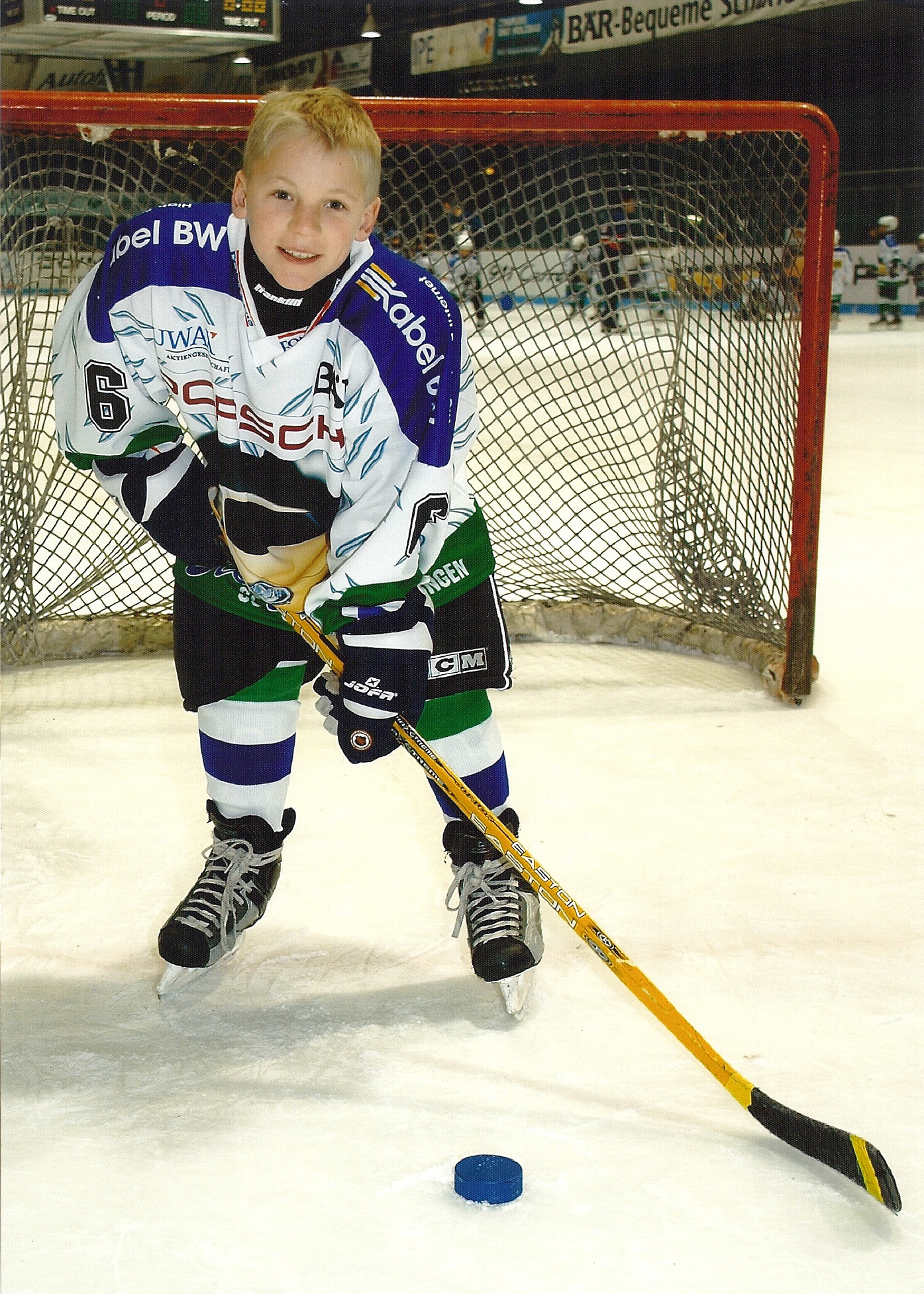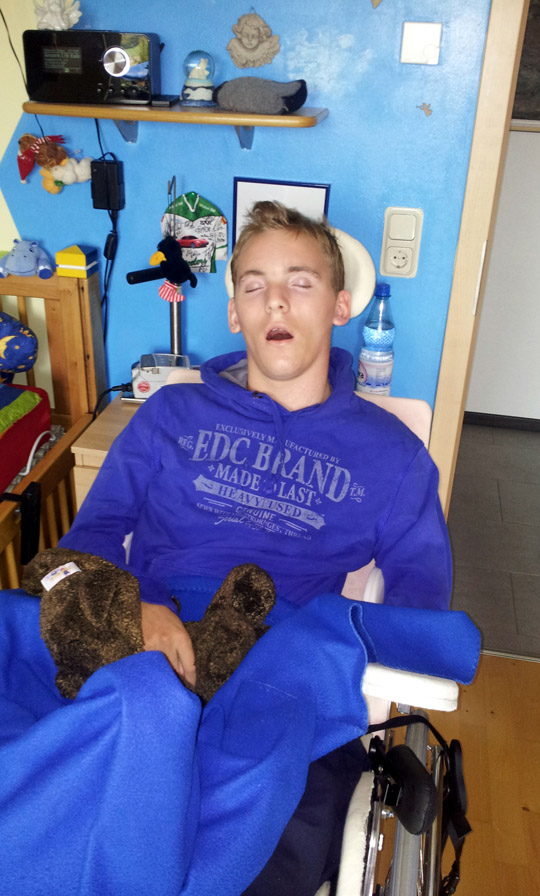 In the early 1990s we lived in Berlin, Germany. We were young and full of plans for the future. My wife Anke was working as a nurse and I had just started my professional career as an engineer. We became a little family when Julian, our older son, was born in the spring of 1992. We built our “nest”, had great friends and neighbours, and simply enjoyed life as a young family.
In the early 1990s we lived in Berlin, Germany. We were young and full of plans for the future. My wife Anke was working as a nurse and I had just started my professional career as an engineer. We became a little family when Julian, our older son, was born in the spring of 1992. We built our “nest”, had great friends and neighbours, and simply enjoyed life as a young family.
As most parents probably are, we were very grateful and thankful. Two years later, during the summer of 1994, our second child, Maximilian, saw the light of day and made our family happiness complete. Back then, we had not the slightest idea of how dramatically our lives would change some years later.
Max turned out to be a blessing and a challenge at the same time: he was so full of energy and life that it was sometimes hard to keep him under control. But he was very charming, even as a baby. He won the hearts of the people around him in no time.
Max in 2005

When he got sick in the winter of 1994/1995, we were a bit worried because of his young age. After all, he was only six months old when measles hit him badly. It had been way too early for vaccination, but not too early for infection. He spent several days with a high fever while his paediatrician feared that he would develop some sort of complications. And he did: his lungs got affected, he developed a dry cough, and sometimes he even had difficulties breathing. We were concerned, but had no clue and nobody had ever mentioned anything about potentially fatal measles complications.
After a few weeks everything was over. Max had recovered and as spring came around, the vivid, high-energy boy was back. What we did not know back then was that he would only stay with us for another 10 years.
When Max was in third grade of elementary school his performance in math suddenly dropped.
Initially we thought that it might have to do with his high energy level and his difficulty concentrating sometimes. But then he started showing some strange behaviours – only for short moments, but becoming more frequent. We did not realise that these were the first signs…
In October of 2004 the first seizure occurred. Max would stop doing anything – from one second to the other – he would sit and stare. Just for a few seconds or sometimes a minute. When the seizure was over, he could not remember anything. We learned that this kind of seizure is called ‘absence’.
The doctors told us that sometimes children would develop this kind of epilepsy when they were just about to enter puberty. So we thought that maybe it would be temporary and eventually go away. But there was a bad sign: Max’s EEG that was taken shortly after his first seizure was entirely abnormal. There were curve patterns that did not belong there. The doctors tried to control the seizures by a special mix of anticonvulsants. And actually it did help – for a few weeks.
Between December of 2004 and February of 2005 our beloved boy seemed to be back. We thought that finally we had everything under control and that the seizures would eventually go away. We didn’t worry about him not going to school anymore, because he couldn’t keep up with the lessons.
We ignored the fact that he could not remember things that had just happened a few hours before.
We ignored the fact that his behaviour became more…We just didn’t want to realise what was happening.
The seizures came back in March. Heavy, frequent and different. The doctors sent us to one of the best epilepsy centres in Germany at Kehl-Kork. They only needed a few examinations to confirm the worst suspicions: Max was diagnosed with SSPE, Subacute Sclerosing Panencephalitis, a late complication of an early age measles disease. Rare, but fatal – in any case, without exception.
It was very hard for us to realise that they were talking about our bright, happy, vivid 10-year-old boy.
We were numb, desperate, did not understand that the doctors were telling us that we would lose our child – no matter what, just a matter of when.
We fought hard for a long time. We spent nights on the internet seeking for rescue, for some sort of treatment that would stop us from going down the path of the inevitable. We established contacts with medical scientists in India, Turkey and the US. We imported homeopathic medicine from India; we applied ß-interferon, vitamins, fish oil, minerals – all the good stuff.
But fate sometimes is relentless: in April of 2006 our boy said good-bye forever. An unexpected thrust of brain inflammation put him into a vegetative state. Within only hours he lost everything he had learned during his young life. His last words were: “I don’t know who you are”. It’s going to haunt us for the rest of our lives.
The following years were characterised by despair, disbelief, unrealistic hope, and many illusions, by anger, and by a very slow process of realising that he will never come back. But above all, there was and still is the everlasting daily struggle to somehow survive as a family. After all, Max’s brother
Julian had just turned 12 when our family was hit by this tragedy. Didn’t at least he deserve to spend his teenage years in an environment that provided as much normality as possible?
Max in 2012

Today – at the age of 18 – Maximilian is still with us. His condition has slowly, but steadily worsened over the years. He can no longer sit or hold his head up. After all those years in which he could at least be fed like a baby, his chewing and swallowing capabilities have lately ceased significantly. His body temperature regulation is unstable; he has many seizures, unpredictable, sometimes strong, sometimes barely noticeable. We feed him by a stomach tube and carry him around in his wheel chair. His level of reaction to his environment varies from little to none. When a day is exceptionally good, he would laugh at Mom or Dad, or his brother, or his nurse when they caress him and talk to him.
Max will die. Nobody knows when or how, but it is inevitable. And we have no idea, if and how we as a family are going to survive this… But what drives us crazy is the fact that all of this could have been avoided, had obligatory vaccination protected more children from getting infected by measles and other dangerous “childhood” diseases.
The measles virus is extremely dangerous. Thousands of children around the world suffer from acute complications such as heart problems, deafness, eye infection, meningitis, hepatitis, bronchitis, Krupp cough, and of course the rare ones like infections of the optic nerve or SSPE.
Other severe diseases such as pox, plague, or poliomyelitis are almost eliminated on this planet, because better hygiene and protection by vaccination has successfully pushed back those infections.
So why don’t we learn? Isn’t it a shame for a developed country like Germany that measles are still an issue?
When it comes to vaccination, parents are not responsible for their own children only – their decision pro or against vaccination may have a significant impact on others! There are proven cases of babies being infected by measles while sitting in a pediatrician’s waiting room. Isn’t that cynical? One of these children died a year ago, from SSPE.
Looking back and considering how life could have been is hurtful. Max did not deserve what has happened to him. It is almost unbearable to accept the fact that under different circumstances or if we had lived in another country back at that time our child would most likely still be healthy. We have lost him forever and it is breaking our hearts. Only in our memories we still see him and he makes us smile. Sometimes the thought of him is choking us. We do not know how long Max will still stay with us, but we will care for him until the end.
*Editor’s update: It is with sadness that we report the death of Max in February 2014*





Pingback
June 1st, 2019
[…] German father wrote about losing his son to SSPE, a rare but invariably fatal side effect of measles infections. Max caught measles at six months, too young to be vaccinated, and SSPE put him into a vegetative […]
Sarah
June 2nd, 2019
This story is heart breaking and I am so sorry for your loss. My son contracted measles last year at 19 months; he had been vaccinated but was too young for the booster so his vaccination was not 100% effective. Are there any tests or screening for SSPE? Whilst I know there is no cure maybe the onset can be delayed?
Pingback
February 3rd, 2020
[…] Panencephalitis, or SSPE. While rare, SSPE is extremely tragic and always ends in death. This father lost his son to SSPE after his son contracted measles as a baby. I’d encourage you to read their story and his plea […]
Pingback
March 18th, 2020
[…] anii ’90, Ruediger Schoenbohm locuia în Berlin alături de soția lui, Anke, și de cei doi copii ai lor, Julian și Max. Pe […]
Renee
July 30th, 2020
Just found out my MIL, who died from a series of epileptic seizures in the last 3 months of her life, had red measles in 1953 and German measles in 1955 when she was 7 and 9 years old. She had epileptic bouts throughout life after that. The last series eventually killed her.